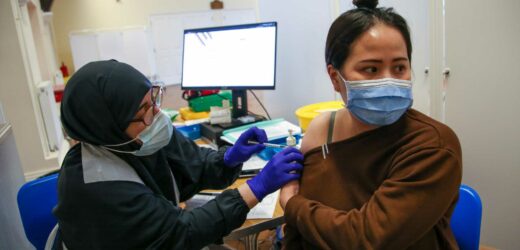AS the UK enters its third year battling Covid, people will increasingly catch the virus for the second or perhaps even the third time.
Omicron is currently the most dominant variant in circulation, and more strains are likely to emerge in the future.
New variants often increase the risk of reinfection, as does waning immunity.
But experts say you are much less likely to be unwell the next time you catch Covid compared to previously.
Vaccines have worked wonders to reduce the severity of disease.
They are the best protection against Omicron, with boosters shown to be up to 80 per cent effective against hospitalisation in the weeks following.
Omicron biologically appears to be milder than Delta, too.
It’s probable that there will be people who catch Omicron twice in the future. But it depends on a number of factors.
Most read in Health
MAN ALIVE! My penis SHRANK more than 1in 'due to Covid damage' & docs say it's permanent
I’m a doctor & this is how WATER or fizzy drinks can give a false positive LFT
The bizarre Omicron symptom that could be an 'emergency warning sign', docs warn
Unusual symptom of Omicron could be linked to using the toilet
These include their immunity, vaccination status, and whether Omicron will even remain dominant if another variant comes along.
Will I catch Omicron twice?
Catching Covid for a second time is called reinfection.
The Government website says reinfection “remains rare, though especially in the context of high prevalence, cases will occasionally occur”.
It says its definition of suspected reinfection is a positive PCR test 90 days (three months) or more after a previous PCR test.
Within those 90 days, old fragments of the virus from the first infection could cause a positive PCR.
Omicron only emerged in late 2021. It has not been 90 days since its discovery in the UK in early December.
Therefore, it’s highly unlikely that a person has caught it twice and been confirmed by laboratory testing.
If Omicron remains prevalent in the UK, we can expect some cases of reinfection moving forward, however.
We already know that people who have caught Covid before are able to get it again.
In the UK there have been hundreds of thousands of people who have tested positive for Covid on more than one occasion.
Around one in 10 new cases of Omicron in England have been linked with a previous infection, the UK Health and Security Agency says.
Immunity drop
Reinfection can occur due to weakened immunity for two reasons.
First, immunity appears to be weakened by Omicron – and the same could happen with future strains.
Protection given by past infection is around 5.4 times less effective against Omicron than it was against Delta, a UK study found.
The immune system does not recognise the virus as efficiently because its mutations have changed its appearance.
Prof Alex Dornburg, assistant professor of bioinformatics and genomics at the University of North Carolina at Charlotte, said: “As new variants arise, previous immune responses become less effective at combating the virus.
"Those who were naturally infected early in the pandemic are increasingly likely to become reinfected in the near future.”
UK data has shown that vaccines are less effective against Omicron.
But the jabs are still an individual's best chance at dodging the strain.
Second, immunity against Covid – either built from previous infection or vaccination – wanes over time.
Data from the UKHSA has shown how long vaccine protection lasts against Covid after two or three jab doses.
It showed that people who got two doses of AstraZeneca have zero protection against Omicron 20 weeks after.
For those with Pfizer or Moderna, the effectiveness is just ten per cent.
Up to a month after a booster jab, vaccine effectiveness against symptomatic infection ranged from around 65 to 75 per cent.
This drops to between 55 and 70 per cent five to nine weeks on, and 40 to 50 per cent from 10 or more weeks.
This data together shows that a booster jab is the most crucial layer of protection against Omicron.
But it also confirms that, as time since vaccination goes on, a person becomes more susceptible to catching Covid, perhaps not for the first time.
In terms of natural immunity, one study by University College London of care home residents and staff found that natural immunity lasts at least ten months.
The good news is that people are very unlikely to pick up the bug twice in one year, the researchers said.
Another study published in The Lancet Microbe found that unvaccinated Covid survivors can expect protection to last three to five years if the virus is still circulating.
But Jeffrey Townsend, the Elihu Professor of Biostatistics at the Yale School of Public Health and the study’s lead author, warned: “Reinfection can reasonably happen in three months or less."
These studies looked at antibodies, which are proteins in the blood that form part of the immune system.
T-cells, another component of immunity, appear to be much stronger.
They form part of hidden defences against the virus which are not as easily studied like antibodies are.
But studies are showing that T-cells can mount a robust attack against Omicron.
They will fight the strain when antibodies fail to, scientists say.
University of Melbourne professor Matthew McKay, who co-led research into T-cells and Omicron, said: “Even if Omicron, or some other variant for that matter, can potentially escape antibodies, a robust T-cell response can still be expected to offer protection and help to prevent significant illness.”
Source: Read Full Article







